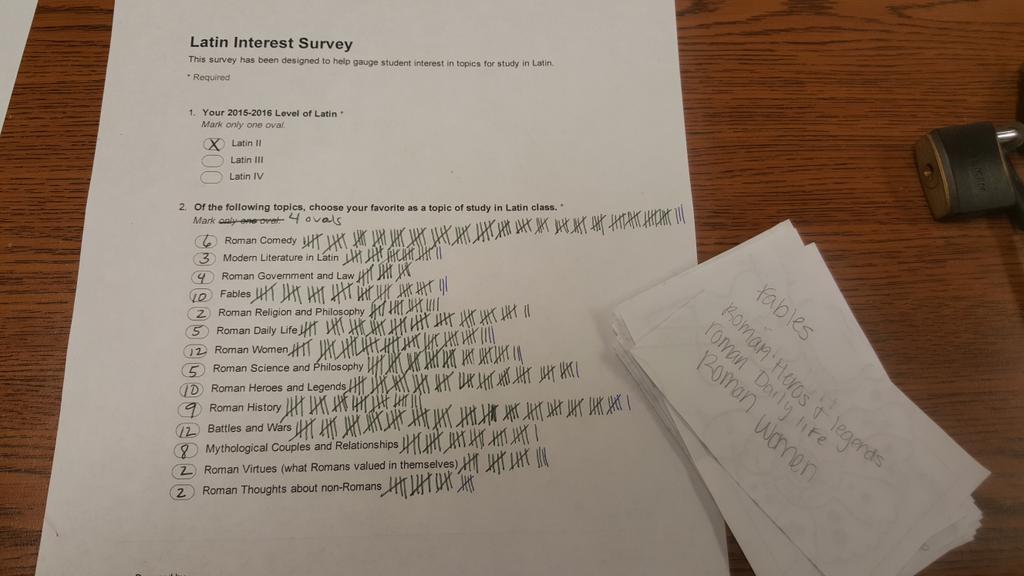I make no promises that my process is elegant or refined, but I do hope it's helpful.
The first thing I want this year is a big picture, both of what needs to be done and where my students stand. Since I am a very lucky Latin teacher who will only have one level of Latin next year, I get to focus exclusively on the status and interests of the students I taught last year.
Big Picture: Themes
At the end of last year I handed out a student interest survey so my students could choose the four topics they were most interested in as our themes for each quarter of this year. There was a clear winner:
So my first semester will be split between Roman comedy and battles and wars.
For Roman comedy, I know I want to let them experience a comedy, read several character introductions and recognize features of stock characters, and experience and recreate common tropes. I have already started gathering materials and will blog about how I organize and scaffold them as I complete them.
I had a much harder time figuring out what I wanted to do with battles and wars. For a Latin teacher and armchair Roman historian, I'm shockingly uninterested in the topic. I offered it because it seems necessary to studying Rome and Romans, and obviously it interests my students. Luckily, I was inspired by some great conversation at ACL Institute (if you haven't gone, you should! There's a scholarship) and a paper I read to turn the battles and wars topic into a game. My current thought on it is that I will choose readings that help students identify good and bad battle strategies, and each class will be fighting its own war against Hannibal to keep him out of Rome. Students will be divided into small groups as well, so the small groups will run cohorts and the cohorts will form the legion. This idea is pretty loosely formed at the moment, but it makes me so much more interested in that unit that I feel I can do a pretty decent job teaching it now. My current plan is to take readings from Caesar and Livy and perhaps Quintus Curtius Rufus.
Big Picture: Vocabulary Frequency
I can't know what my students know right now, since I won't see them for another three weeks. However, I can look at what I taught (or intended to teach) and compare it to my goals for my students, which have matured since this time last year.
Last year, I wrote about how I was choosing vocabulary in this post. However, I am not sure I emphasized how much I was allowing the end of year Latin test dictate that vocabulary list. It really did control almost everything I chose for my students to learn, and I have no small amount of regret over that. I reassessed what I really want for my students, and I found it's not to be successful at a test; I want them to be able to sit down and read Latin by the end of four years. They can't do that if they aren't learning high-frequency words.
I decided to use Dickinson College's Latin Core Vocabulary list, a list of nearly 1000 words. This will be my guide when choosing vocabulary for my students in the rest of their Latin classes with me.
To figure out what words to review at the beginning of the year, I compared last year's word list to the Dickinson College list, and I'm not particularly happy with what I found:
 You don't need to be able to read the words to see how much red is on that image. Each red word is a word that cannot be found anywhere on the Dickinson list. Out of 218 words, 58 of them are red. 27% of the words I taught last year are not high-frequency words.
You don't need to be able to read the words to see how much red is on that image. Each red word is a word that cannot be found anywhere on the Dickinson list. Out of 218 words, 58 of them are red. 27% of the words I taught last year are not high-frequency words.
This matters because in order to help my students maintain previous vocabulary, I make sure to recycle words back into our new readings and stories. If I'm putting all this energy into making sure they learn a word they might never see when reading original texts of Latin, I am essentially being wasteful. Wasting their and my time and energy.
This is not to say that I think it is bad for students to learn words that are high-interest even if they aren't high-frequency. But they will learn those without me recycling them and focusing on them, because they're interested in them. My concern is what I am focusing class time on.
So I will start the year focusing on the remaining 160 high-frequency words. I am not sure what shape the review will take at the moment, but I'm thinking Latin novella.
Next Steps
Today and tomorrow (and for however long) I will start writing a novella for students to use for a review of the high-frequency vocabulary from last year. I will also start reading over potential comedy scenes for use in class. My husband (who is a gamer like I am) will help me crystallize game mechanics for the war with Hannibal. As I complete things, I'll post on the blog both so you can see what I'm doing and as a great way for me to review my own work when I need to.
Please feel free to comment below with reading suggestions as well as what you are doing to prepare for the beginning of school this year!

No comments:
Post a Comment